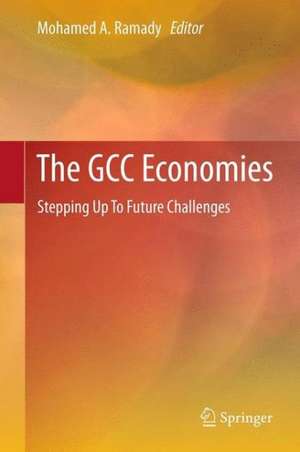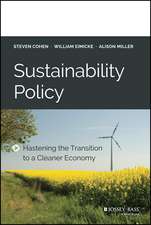The GCC Economies: Stepping Up To Future Challenges
Editat de Mohamed A. Ramadyen Limba Engleză Paperback – 7 mai 2014
A new Gulf is rising, one that is more self assertive, looking to expand its membership to other Arab countries such as Jordan and Morocco, while at the same time strengthening the bloc’s relationship with current and emerging trading and strategic partners in Europe, USA and Asia.
Regional and international realities, especially the uncertainties unleashed by the ‘Arab Spring’, are forcing Gulf leadership to initiate new policies involving closer cooperation amongst GCC countries to address emerging challenges.
This volume brings together thirty renowned academics and specialists to examine a range of multifaceted social, political and economic issues facing the GCC in key areas such as:
· Diversification from a high dependency on a narrow hydrocarbon base
· Social transformation, youth employment and effective gender participation
· Outward and inward foreign direct investment flows
· Prospects for education reforms and e-learning.
· Sustainable security in oil, renewable energy (including nuclear) and food
· Corporate governance, transparency and enhancing the private sector's operating environment
· The role and governance of Gulf Sovereign Wealth Funds in investing their surpluses.
The volume also offers insights for challenges facing the GCC in monetary union, expanding the regional debt market and Sukuk issuance, GCC intellectual property rights application, detailed assessments of individual GCC country risk analysis, as well as the sustainability of long term government fiscal stimulus programs at the expense of private sector involvement.
| Toate formatele și edițiile | Preț | Express |
|---|---|---|
| Paperback (1) | 784.79 lei 6-8 săpt. | |
| Springer – 7 mai 2014 | 784.79 lei 6-8 săpt. | |
| Hardback (1) | 1117.69 lei 6-8 săpt. | |
| Springer – 24 apr 2012 | 1117.69 lei 6-8 săpt. |
Preț: 784.79 lei
Preț vechi: 957.06 lei
-18% Nou
Puncte Express: 1177
Preț estimativ în valută:
150.18€ • 157.91$ • 124.08£
150.18€ • 157.91$ • 124.08£
Carte tipărită la comandă
Livrare economică 17 aprilie-01 mai
Preluare comenzi: 021 569.72.76
Specificații
ISBN-13: 9781489997128
ISBN-10: 1489997121
Pagini: 372
Ilustrații: XLVIII, 324 p.
Dimensiuni: 155 x 235 x 20 mm
Greutate: 0.52 kg
Ediția:2012
Editura: Springer
Colecția Springer
Locul publicării:New York, NY, United States
ISBN-10: 1489997121
Pagini: 372
Ilustrații: XLVIII, 324 p.
Dimensiuni: 155 x 235 x 20 mm
Greutate: 0.52 kg
Ediția:2012
Editura: Springer
Colecția Springer
Locul publicării:New York, NY, United States
Public țintă
ResearchCuprins
Dedication.- Acknowledgements.- Contributors.- Overview.- Mohamed A. Ramady.- Part 1 Regional Structural Reforms and Engines of Change .- 1 Working for a Sustainable GCC Future: Reflections on Policies and Practices, Nabil Sultan.- 2 Deepening the GCC Debt Market: The Saudi Arabia Experience, Abraham Abraham, and Fazal Seyyed.- 3 GCC economic integration: statistical harmonization for an effective Monetary Union, Ikhlaas Gurrib.- 4 E-Learning in the Arab Gulf: Responding to the Changing World of Education, Nabil Sultan, Sylvia van de Bunt-Kokhuis, Christopher Davidson, Alain Sentini, and David Weir.- Part II Sustainable Security: Oil, Renewable Energy and Food .- 5 Energy Security in the EU from the GCC’s Perspective, Mohammed A. Alsahlawi.- 6 Going Nuclear in the GCC countries –Rationale, Challenges and Politics, Ashutosh Sharma, Nabil Sultan and David Weir.- 7 Meeting the Renewable Energy and Sustainability Challenges in GCC Economies: MASDAR Initiative Case Study, Toufic Mezher and Jacob Park.- 8 Food Security in the GCC Economies, Andy Spiess.- Part III Regional Risk, Global Competitiveness and Economic Diversification.- 9 GCC Country Risk Analysis, Hassan El Sady.- 10 The Macroeconomic Competitiveness of the GCC Economies, Ahmed Khalifa.- 11 GCC Intellectual Property Regimes: Global Harmonization or Regional Integration?, David Price.- 12 Economic Diversification in Saudi Arabia: The Need for Improving Competitiveness for Sustainable Development, M. Sadiq Sohail.- 13 Successful Outward FDI investments: Saudi Lessons and Recommendations, Marwan Al Qur’an.- 14 Foreign Direct Investment in Saudi Arabia: A Competitiveness Analysis, Mohammad H. Akhtar.- Part IV Corporate Governance, Transparency and Private Sector Operating Environment.- 15 Corporate Disclosure and Reporting Practices in the Gulf Cooperation Council (GCC), Haidar H. Madani.- 16 Corporate Governance regulations - The Experience of Saudi Arabia, Nadia Anani.- 17 An analysis of entrepreneurship characteristics in Saudi Arabia, Hazbo Skoko.- 18 The Dynamics of Entrepreneurial Motivation among Women: A Comparative Study of Businesswomen in Saudi Arabia and Bahrain, Mohammed Sadi and Basheer Al-Ghazali.- 19 Influencing Factors Model of Information and Communication Technology (ICT) in Saudi Arabian Small and Medium Enterprises (SMEs), Hazbo Skoko.- Part V Investing Surplus Wealth: GCC Sovereign Wealth Funds (SWF’s).- 20 GCC Sovereign Wealth Funds: Challenges, Opportunities and Issues Arising from their Growing Presence on the Global Landscape, Ruth Rios-Morales, Mohamed A. Ramady, and Louis Brennan.- 21 The Misconceptions in the West regarding the Gulf Region Sovereign Wealth Funds, Behzad Shahandeh.- 22 The Governance of Sovereign Wealth Funds from the GCC in an International Perspective, Sven Behrendt.- 23 Putting Sovereign Wealth Funds to Good Use: Strategic Options for SWFs in the Gulf Cooperation Council (GCC) Region, Mohammed Salisu and Nahed Taher.- Bibliography.- Index
Textul de pe ultima copertă
The ‘Arab Spring’ of 2011 has affected the countries of the region to varying degrees, including the Gulf Cooperation Council (GCC) members, comprising Saudi Arabia, Kuwait, Qatar, the United Arab Emirates, Oman and Bahrain. The GCC has become a significant regional bloc playing a vital economic and political role far beyond its shores, given its geopolitical strategic location, a preponderance of global energy reserves and a major international player through the use of accumulated financial reserves.
A new Gulf is rising, one that is more self assertive, looking to expand its membership to other Arab countries such as Jordan and Morocco, while at the same time strengthening the bloc’s relationship with current and emerging trading and strategic partners in Europe, USA and Asia.
Regional and international realities, especially the uncertainties unleashed by the ‘Arab Spring’, are forcing Gulf leadership to initiate new policies involving closer cooperation amongst GCC countries to address emerging challenges.
This volume brings together thirty renowned academics and specialists to examine a range of multifaceted social, political and economic issues facing the GCC in key areas.
A new Gulf is rising, one that is more self assertive, looking to expand its membership to other Arab countries such as Jordan and Morocco, while at the same time strengthening the bloc’s relationship with current and emerging trading and strategic partners in Europe, USA and Asia.
Regional and international realities, especially the uncertainties unleashed by the ‘Arab Spring’, are forcing Gulf leadership to initiate new policies involving closer cooperation amongst GCC countries to address emerging challenges.
This volume brings together thirty renowned academics and specialists to examine a range of multifaceted social, political and economic issues facing the GCC in key areas.
Caracteristici
Contains contributions from experts from GCC countries on the future of energy and economic policy in the region
Provides analysis of an extremely topical issue in light of recent political movements sweeping the Middle East
Develops inter-linked themes and research tracks that complement each other to provide a holistic approach to the challenges facing the GCC Uses country examples that can be a model for other GCC countries
Provides analysis of an extremely topical issue in light of recent political movements sweeping the Middle East
Develops inter-linked themes and research tracks that complement each other to provide a holistic approach to the challenges facing the GCC Uses country examples that can be a model for other GCC countries






